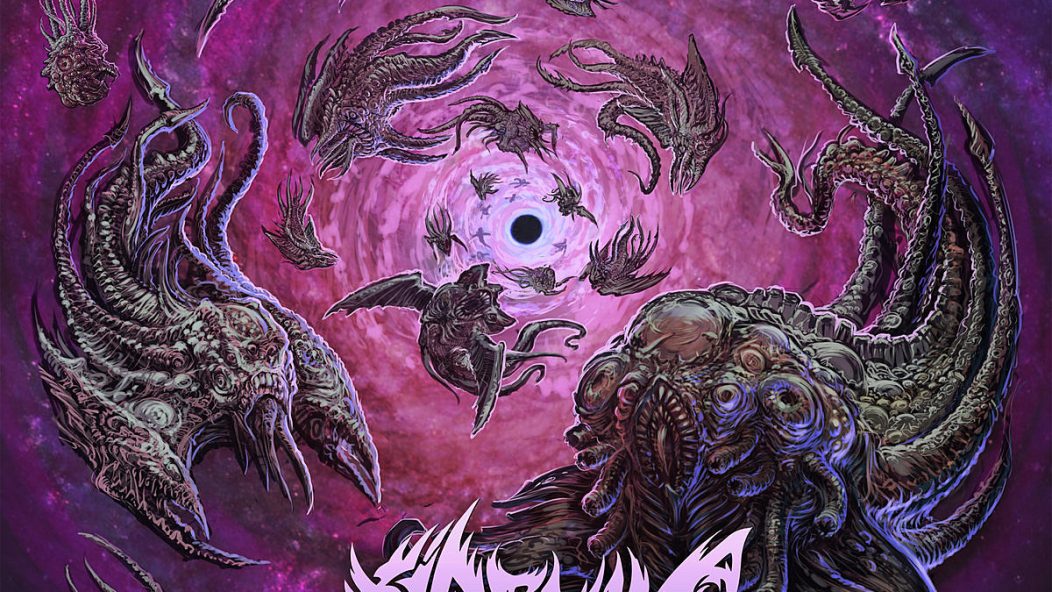
Piercing the Veil #8: Devil's Reef Plunges into Lovecraftian Abysses
H.P. Lovecraft’s petulant weirdness has ground its tentacles so deep into popular culture that there is still dispute over how to pronounce his most famous creation. Many take inspiration from his grotesque imagery (though another recount of heavy metal’s relationship with the author’s pungent productions would be perfunctory), but there’s equally as much art that examines his interest in the relationship between fear, science, and the unknowable. For reference, look no further than Thomas Dolby’s heart wrenching tale of science being weaponized in an act so abhorrent it literally blinds the protagonist, “She Blinded Me With Science.”
It’s a tad ironic, then, that Maryland-based group Devil’s Reef repurpose Lovecraft’s haughtiness in much the same manner as they do technical death metal. “Our whole goal is to make death metal digestible again,” says guitarist Logan Abernethy. He, alongside vocalist and guitarist Brady Allen, sat down with us a few weeks ago over Zoom to talk about their productive past year and their founding musical philosophies. For them, the fear of the unknown and the process through which one immerses themselves in newfound knowledge can be as dangerous as it is beneficial.
…
…
Devil’s Reef, who also claim Luka Stinar on drums, wrung 2021’s productive juices dry as they released their debut LP Chosen by the Sea this past February, followed it up with October’s A Whisper from the Cosmos EP, and, at the time of our interview, were putting the finishing touches on their next project. If the band’s name wasn’t evidence enough of their Lovecraftian interests (it comes from Lovecraft’s “The Shadow Over Innsmouth”) then parse through “Cosmic Horrors'” lyrics.
Take me where no man has been, to places that never existed
I have seen beyond the bounds of infinity
Drawn down daemons from the stars, they stride from world to world to sow death and madness
The cut taps into fears of the unknown by revealing what lies outside our perception. It’s the monkey’s paw of knowledge. Devil’s Reef propose that it’s better to remain in the dark, because the truth is beyond what some can, or what they’d even want to, perceive.
However, they themselves do not adhere to this lifestyle. Devil’s Reef ponder hysteria’s possibilities rather than recoil in fear. Their Lovecraftian window dressing is driven by genuine interest, or, rather, by necessity. The band’s earliest tracks paired nautical horror with existentialism. Allen and Abernethy grew fond of them but were more excited by how the narratives opened up avenues for musical experimentation. “It was an excuse to use plenty of effects and keyboards,” they say. “In the records that have come out we’ve used them sparingly, we don’t [want to] overdo it. But we’re learning that all the parts that have it have this layer to them that adds so much. It would be unwise to shy away from something like that, to be able to thicken up the songs. Plus, it fits with our theme, so why the hell not?”
The flangers and phasers that ebb through Devil’s Reef’s guitars provide texture that elevate their technically-informed death metal. Their intricate musicianship recalls the curiosity of 90s progressive death metal heavyweights like Death and Cynic in both ambition and execution. The group’s serrated guitars and electronic vocal effects will jog any death metal fan’s memory, yet their inquisitiveness into what lies beyond solidifies their singularity.
There’s no genre that permits Allen and Abernethy as much freedom as death metal. “There’s a different intensity you can get from extreme music that you can’t get with clean vocals. And there is great music that does that but I think death metal has the most dynamics. We can go all the way clean, or we can crank it to ten and have no limits.”
…
…
Funnily enough, their statement almost contradicts the band’s intent to make death metal digestible. Crafting entire EPs around the descent into madness while trying to convey that plunge coherently seem like tasks better suited for music that throttles against accessibility. But there’s no other way for Devil’s Reef. “The best part of the [Lovecraftian] horror is that it’s unimaginable, and death metal has a good way of contextualizing the unimaginable.” Therefore, Devil’s Reef streamline their sound so that their ideas permeate more forcefully. They can be approached, understood, and enjoyed, rather than being erudite lessons shrouded behind a steep entry barrier.
Lovecraft’s prose is just as much a musical inspiration as it is an academic inquiry for Devil’s Reef. The group matches Lovecraft’s shifting tensions by modulating their complexity throughout songs. “A lot of Lovecraft is the fear of the unknown. Making it feel like nobody knows what’s going on. Or maybe there’s a break and there’s clarity where people figure out what’s going on, so that’s when we settle things down.” Thus, they curtail their songwriting to the same pensive episodes and chaotic outbreaks that scored Lovecraft’s stories.
Allen expands on this further, “Lovecraft doesn’t care about characters, his characters are just guys who fall into realms of monsters and chaos. They didn’t ask to be there. That fits with death metal because we can do all levels of intensity. It can be crazy or it could be thrashy and fun. We can do it all because there are those parts in the stories.”
Rather than drown their audience in incongruous bile Devil’s Reef articulate Lovecraft’s internal fears. They look to his stories as tool sheds which house instruments they can use to dot their canvas. In their most successful attempts, they surpass Lovecraft’s infamous nihilism by striving to find optimism amidst madness.
“That’s what Whispers from the Cosmos is really about–opening your mind to all of the things that we don’t understand that these extraterrestrial/extra-dimensional beings can show us, and we can learn something new from it. It’s kind of a good thing, you might lose yourself in the descent but you could become something better,” Allen says.
Their questions about lunacy don’t end once their protagonist loses his sanity. Whispers from the Cosmos asks how shrugging life’s stringent shackles can lead to new experiences and a more appreciative mindset. Yeah, you might end up kneeling beneath Dagon, but that’s a glass-is-half-empty interpretation. For Devil’s Reef, descending into madness can be an illuminating procedure.
…
Follow Devil’s Reef on Bandcamp.
…











